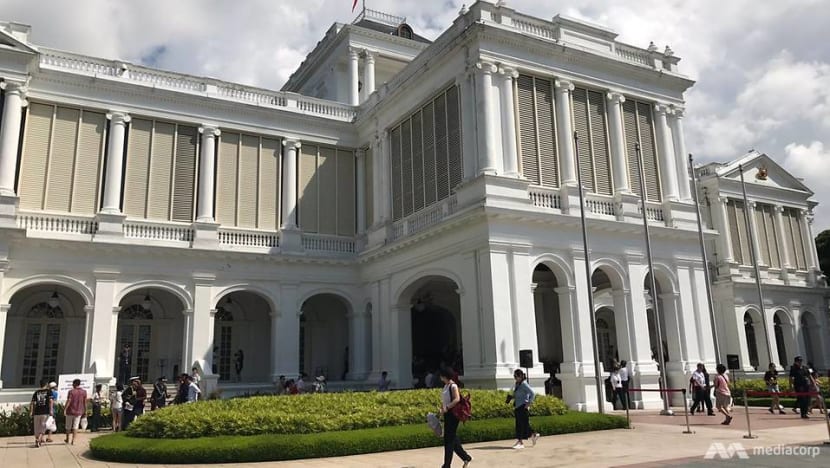Heart of the Matter: Presidential election walkover not ideal, but getting candidates to come forth is a challenge, political watchers say
With Senior Minister Tharman Shanmugaratnam announcing his candidacy, will the upcoming Presidential Election be a walkover like the last one? The Heart of the Matter podcast discusses the role of the office and the challenge in attracting strong candidates.

File photo of the Istana. (Photo: Elizabeth Neo)
SINGAPORE: Senior Minister Tharman Shanmugaratnam announced on Thursday (Jun 8) that he intends to resign from the People’s Action Party (PAP) and stand as a candidate for the upcoming presidential election.
So far, he is the only candidate to throw his hat in the ring.
A new head of state will need to be elected before Sep 13 this year.
First-time voter Nur Ridhuan, 28, is hoping he will get a chance to exercise his right to vote and that it will not be another walkover like the last.
“The walkover (in the last election) didn't give her (President Halimah Yacob) a chance to stand out and talk about her perspectives about why she thinks she might be a good candidate compared to other candidates,’’ said the business analyst.
Mr Ridhuan was one of three guests on the latest episode of the Heart of the Matter podcast. He was joined by Eugene Tan, associate professor of law at the Singapore Management University, and Felix Tan, associate lecturer at the Nanyang Technological University.
When asked by host Steven Chia what he would like to see in a candidate, Mr Ridhuan said it should ideally be someone more “proactive” in asking the government of the day questions about political appointments and the reserves.
Assoc Prof Tan said that the role of the President in Singapore is unique in that while it is an elected position, it is not “an alternative centre of power”.
Listen: What is the role of the President?
While the process of making decisions - such as dipping into the reserves - are not “played out in public”, Assoc Prof Tan noted that the President does make weighty decisions.
“The elected President could act as a speed bump in the event where the President and the Council (of Presidential Advisors) think that things are not going quite the way they should.’’
The podcast discussion also touched on the challenge of getting quality candidates to come forward during the election.
While voters are sensitive to candidates with close ties to the ruling party, Assoc Prof Tan said the bigger challenge is attracting candidates from the private sector who are capable and want to put their names in the hat.
“We must recognise that when times are good, (there are) no compelling reasons for people to run ... Because when you take public office, your life, your privacy, as well as your family’s, will be subject to public scrutiny.
“If you're making a good living, you're happily doing what you're doing, it will take a lot for these men and women to say, ‘Let me give it all that up and run for office.’”
Here are other highlights of the conversation:
THE ROLE OF THE PRESIDENT
Dr Felix Tan: Some of us (think) the President has to be antagonistic to the government and say, "Oh, because she or he is so quiet, therefore, the President is just a rubber stamp." That's a problem there because the President does not necessarily have to be antagonistic. If that is the expectation from the public, then I think there's a misunderstanding of the role of what the President is supposed to do.
Assoc Prof Eugene Tan: The government, knowing that there's someone who is overseeing the appointments, overseeing the use of past reserves, would then be more careful ... So imagine in a previous system when there was no second key … the government of the day would have its way ... But now we have the President who is also supported by the Council of Presidential Advisors, who would give their recommendations as well. That makes the appointment (of public officers) and the use of past reserves a much more robust process.
PUBLIC OR PRIVATE CANDIDATE?
Assoc Prof Tan: Regardless of whether he or she comes from a public or private sector, if (they are) so closely connected with the establishment or the government of the day, that could potentially put off some voters.
But we must also remember that, when people are elected to the position, there's a certain expectation that they live up to the oath of office. And that means being nonpartisan.
Mr Ridhuan: It is a symptomatic problem, because we recognise that the presidential election requires people to meet a very stringent criteria. And we continuously see people coming from the same background, same party, who can meet these criteria … it is a sign of something. Whether or not it is something that we have to rectify? I don't know.
Listen to the full episode here. A new episode of Heart of the Matter drops every Friday. Follow the show on Spotify, Google or Apple podcasts for the latest updates.










.png?itok=T-l3_fCN)





